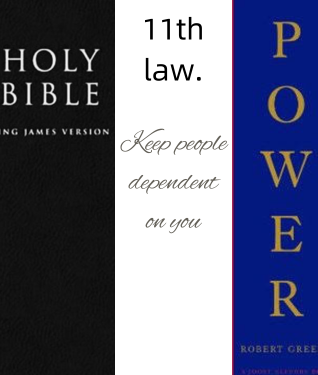The Intrigue of Power Dynamics in Ancient Tales.”
The Bible, a tapestry of ancient narratives and moral teachings, also holds within its verses the subtle echoes of Robert Greene’s “48 Laws of Power.” One such law, the 11th, advises mastering the art of keeping people dependent. In this exploration, we delve into biblical stories to unravel the essence of this principle and its consequences.
“Joseph’s Ascent: A Tale of Strategic Dependency.”
In the book of Genesis, we encounter Joseph, a son of Jacob. Initially scorned and betrayed by his siblings, Joseph’s journey takes a pivotal turn when he interprets Pharaoh’s dreams of impending famine and abundance. By advising Pharaoh to store grain during the years of plenty, Joseph strategically positioned himself and Egypt to be indispensable during the lean years. The populace grew reliant on this stored sustenance, cementing Joseph’s influence and illustrating the power of keeping people dependent.
However, the consequences of this strategy reverberated through generations. When Joseph’s descendants, the Israelites, found themselves under Egyptian oppression, their once-venerated status turned into servitude. The lesson here is nuanced: while strategic dependency can yield power, it can also lead to unintended consequences for future generations.
“Solomon’s Dilemma: The Erosion of Wisdom.”
King Solomon, revered for his wisdom and guidance, initially exemplified the principles of power. His astuteness in judgment, ability to surround himself with capable advisors, and prudent rule showcased his prowess in power dynamics. Yet, Solomon’s later years saw him succumbing to unchecked desires, accumulating wealth, and taking on an excess of wives. This lavish lifestyle led to a burdensome reign with heavy taxes and forced labor, straying from the 11th law.
The consequences were profound: after Solomon’s reign, the once-united kingdom fractured into two, setting the stage for centuries of division and strife. Solomon’s departure from the principle of strategic dependency serves as a cautionary tale, illustrating the delicate balance between wielding power and maintaining it.
“Esther’s Triumph: A Play of Strategic Alliances.”
The Book of Esther introduces us to a remarkable woman who became the queen of Persia. Esther, an orphaned Jewish girl, relied on her cousin Mordecai for guidance and mentorship. This strategic alliance empowered Esther to navigate the complex Persian court and uncover a plot against the king. By preserving her dependence on Mordecai, she cemented her influence within the court, illustrating the art of keeping people reliant on one’s wisdom and alliances.
Yet, the consequences of this power play were substantial. Esther’s actions, while safeguarding her people, also had repercussions that echoed through history. The enmity and animosity stirred by the exposure of the plot affected generations, illustrating the ripple effects of wielding power through strategic dependency.
“Saul’s Tragic Descent: The Cost of Disobedience.”
The tale of King Saul portrays the tragic consequences of failing to heed the principles of strategic dependency. Anointed as the first king of Israel, Saul’s early reign displayed promise and potential. However, his impatience and disobedience to divine directives ultimately led to his downfall.
Saul’s disobedience, a deviation from the principle of strategic dependency, cost him divine favor and the stability of his kingdom. His inability to execute a divine command led to the rise of David as the next king, setting in motion a series of events that shaped the course of history. Saul’s tragic descent serves as a stark reminder of the price one pays for deviating from strategic principles in the pursuit of personal glory.
Conclusion: Navigating Power with Wisdom and Balance.
In the interplay of these biblical characters and the 11th law of power, we glean valuable insights into the delicate dance of influence and control. The nuances of strategic dependency, as illustrated through Joseph’s ascent, Solomon’s downfall, Esther’s triumph, and Saul’s tragic descent, reveal the profound impact it can have on individuals and nations.
As we traverse our own paths, seeking to wield influence and navigate the intricate web of power dynamics, let us reflect on these tales. Strive to harness the principles of strategic dependency with wisdom and balance, mindful of the consequences that may echo through the corridors of time. In doing so, we can hope to shape our destinies with grace, understanding, and a firm grasp of the art of power.







































Discussion about this post